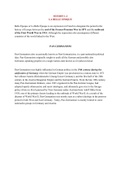SESSION 1-2
LA BELLE EPOQUE
Belle Époque or La Belle Époque is an expression in French to designate the period in the
history of Europe between the end of the Franco-Prussian War in 1871 and the outbreak
of the First World War in 1914. Although the expression also encompasses different
countries of the world linked to the West.
PAN-GERMANISM
Pan-Germanism also occasionally known as Pan-Germanicism, is a pan-nationalist political
idea. Pan-Germanists originally sought to unify all the German and possibly also
Germanic-speaking peoples) in a single nation-state known as Großdeutschland.
Pan-Germanism was highly influential in German politics in the 19th century during the
unification of Germany when the German Empire was proclaimed as a nation-state in 1871
but without Austria (Kleindeutsche Lösung/Lesser Germany), and the first half of the 20th
century in the Austro-Hungarian Empire and the German Empire. From the late 19th century,
many Pan-Germanism thinkers, since 1891 organized in the Pan-German League, had
adopted openly ethnocentric and racist ideologies, and ultimately gave rise to the foreign
policy Heim ins Reich pursued by Nazi Germany under Austrian-born Adolf Hitler from
1938, one of the primary factors leading to the outbreak of World War II.As a result of the
disaster of World War II, Pan-Germanism was mostly seen as a taboo ideology in the postwar
period in both West and East Germany. Today, Pan-Germanism is mainly limited to some
nationalist groups in Germany and Austria.
, PAN-SLAVISM
Pan-Slavism, a movement which crystallized in the mid-19th century, is the political ideology
concerned with the advancement of integrity and unity for the Slavic-speaking peoples. Its
main impact occurred in the Balkans, where non-Slavic empires had ruled the South Slavs for
centuries. These were mainly the Byzantine Empire, Austria-Hungary (both as separate
entities for most of the period), the Ottoman Empire, and Venice.
- Origins:
Extensive pan-Slavism began much like Pan-Germanism, both of which grew from the sense
of unity and nationalism experienced within ethnic groups after the French Revolution and
the consequent Napoleonic Wars against European monarchies. Like other Romantic
nationalist movements, Slavic intellectuals and scholars in the developing fields of history,
philology, and folklore actively encouraged the passion of their shared identity and ancestry.
Pan-Slavism also co-existed with Southern Slavic independence.
Commonly used symbols of the Pan-Slavic movement were the Pan-Slavic colours (blue,
white and red) and the Pan-Slavic anthem, Hey, Slavs.
,The first pan-Slavists were the 16th-century Croatian writer Vinko Pribojević and the
17th-century Aleksandar Komulović, Bartol Kašić, Ivan Gundulić and Croatian Catholic
missionary Juraj Križanić.[1]
[2][3] Some of the earliest manifestations of Pan-Slavic thought
within the Habsburg Monarchy have been attributed to Adam Franz Kollár and Pavel Jozef
The movement began following the end of the Napoleonic Wars in 1815. In the
Šafárik.[4]
aftermath, the leaders of Europe sought to restore the pre-war status quo. At the Congress of
Vienna, Austria's representative, Prince von Metternich, felt the threat to this status quo in
Austria was the nationalists demanding independence from the empire. While their subjects
were composed of numerous ethnic groups (such as Italians, Romanians, Hungarians, etc.),
most of the subjects were Slavs.
First Pan-Slav congress in Prague, june 1848
The First Pan-Slav congress was held in Prague, Bohemia in June, 1848, during the
revolutionary movement of 1848. The Czechs had refused to send representatives to the
Frankfurt Assembly feeling that Slavs had a distinct interest from the Germans. The
Austroslav, František Palacký, presided over the event. Most of the delegates were Czech and
Slovak. Palacký called for the cooperation of the Habsburgs and had also endorsed the
Habsburg monarchy as the political formation most likely to protect the peoples of central
Europe. When the Germans asked him to declare himself in favour of their desire for national
unity, he replied that he would not as this would weaken the Habsburg state: “Truly, if it were
not that Austria had long existed, it would be necessary, in the interest of Europe, in the
interest of humanity itself, to create it.”
The Pan-Slav congress met during the revolutionary turmoil of 1848. Young inhabitants of
Prague had taken to the streets and in the confrontation, a stray bullet had killed the wife of
Field Marshal Alfred I, Prince of Windisch-Grätz, the commander of the Austrian forces in
Prague. Enraged, Windischgrätz seized the city, disbanded the congress, and established
martial law throughout Bohemia.
, IRREDENTISM
Irredentism describes various political and/or popular movements that claim, reclaim (usually
on behalf of the corresponding purported nation), and seek to occupy territory that the
movement's members consider to be a "lost" (or "unredeemed") territory, based on history or
even legend. (The breadth of this definition’s scope -- sometimes despite unclarities of the
historical bounds of the putative nations or peoples -- is subject to terminological disputes
about any underlying claims of expansionism.)
GOOD EXAMPLE:





